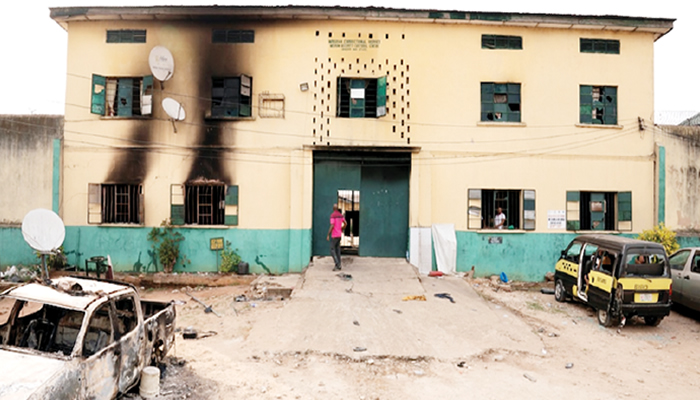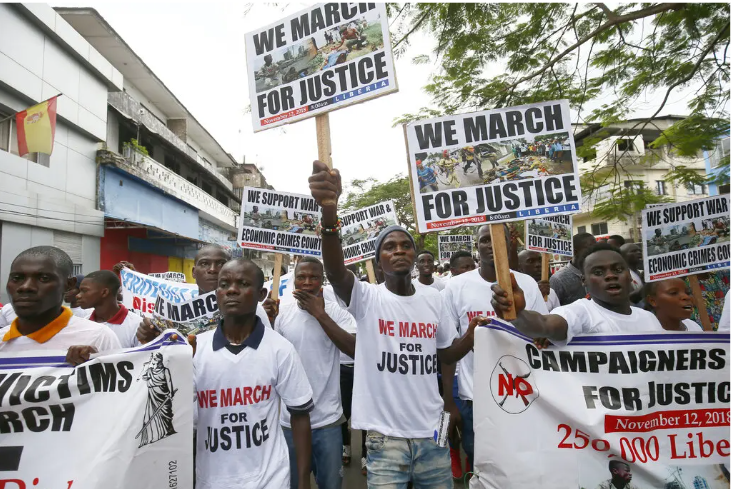Nigeria has faced a surge in prison breaks in recent years, revealing deep-seated flaws within the country’s correctional facilities. The jailbreaks, which have occurred across the country, point to a broader security crisis that poses a serious threat to Nigeria’s justice system and public safety. Once designed to confine and rehabilitate offenders, the correctional facilities have become increasingly vulnerable to daring escape attempts, turning them into revolving doors for a growing number of criminals. The frequency of jailbreaks not only jeopardises the administration of justice but also fuels fear and instability in a nation already dealing with widespread insecurity.
Nigeria has experienced a succession of prison breaks, with incidents of inmate escapes reported at various correctional facilities nationwide. In 2016, jailbreak incidents were reported in Enugu, Kogi, and Abuja. The following year, 2017, saw additional jailbreaks in Enugu and Akwa Ibom States. In 2018, a jailbreak in Niger State led to the escape of 210 inmates. The most infamous incident took place in 2021 when more than 1,800 inmates escaped from the Owerri Correctional Facility in Imo State following a violent armed attack. This event and similar ones in Oyo, Kogi, and Edo states have exposed significant weaknesses in prison security. Most recently, on Wednesday, April 24, 119 inmates escaped from the Medium Security Custodial Services in Suleja, Niger State, following a heavy downpour which destroyed the facility.
These jailbreaks often involve armed groups or insurgents who are capable of overpowering correctional officers and breaching security systems. This raises concerns about the effectiveness of prison infrastructure, the competence of prison staff, and the coordination among security agencies. The July 2022 Kuje Custodial Centre prison break, which resulted in the escape of at least 600 inmates, including suspects linked to Boko Haram, mirrored earlier violent breakouts in Owerri and Edo, reflecting a troubling trend. According to reports, more than 7,000 inmates have escaped from Nigerian prisons from 2015 to 2022, with an estimated 15 jailbreaks underscoring the need for significant improvements in prison security and management.
Frequent jailbreaks in Nigeria reflect significant flaws in the nation’s criminal justice system. Infrastructural issues, overcrowding, inadequate funding, systemic corruption, and poor training of prison personnel are among the most critical issues. The overcrowding, due in large part to lengthy pre-trial detentions, leads to prisons operating at or beyond capacity, fostering an environment conducive to violence and disorder. Additionally, the co-location of convicted criminals and pre-trial detainees within Nigerian correctional facilities complicates security measures and increases the risk of unrest. These conditions, exacerbated by systemic corruption, create an environment where criminal elements can more easily exploit the system. With inmates often outnumbering wardens considerably, adequate supervision becomes increasingly tricky, heightening the potential for chaos.
Infrastructure issues further compound the problem, as many facilities are dilapidated and poorly maintained, making them vulnerable targets for attackers. According to a statement released by the Public Relations Officer, FCT Command, Adamu Dazu, “The Service is not unmindful of the fact that many of its facilities were built during the colonial era and that they are old and weak”. Corruption plays a pivotal role, with weaknesses in intelligence gathering and allegations of bribery within the Nigerian Correctional Service (NCoS) enabling inmates and their accomplices to orchestrate jailbreaks. In 2021, the House of Representatives voiced concerns over the condition of the correctional facilities and decided to investigate the ₦613 billion allocated to the agency over the decade from 2010 to 2019. The legislators noted that the federal government allocates ₦17 billion annually for inmate meals across 244 correctional facilities. Yet, inmates continue to endure harsh living conditions, raising serious questions about human rights violations. The culmination of these factors underscores the need for comprehensive reform in Nigeria’s criminal justice system to address overcrowding, corruption, and inadequate security protocols, ensuring safer and more effective correctional facilities.
The impact of jailbreaks in Nigeria extends beyond the immediate threat to prison security, creating a broader risk to public safety and national security. Dangerous criminals and insurgents who manage to escape undermine the rule of law and contribute to a growing sense of instability. In regions already grappling with violence, insurgency, and banditry, the escape of high-profile inmates can lead to further violence and unrest. Efforts by the Nigerian government to respond to these jailbreaks have seen limited success. Although ongoing initiatives aim to recapture escaped prisoners and bolster prison security, a significant number of escapees remain at large. This failure to promptly apprehend escaped inmates not only empowers criminal groups but also casts doubt on the government’s ability to maintain law and order.
To mitigate prison breaks in Nigeria, a comprehensive approach that addresses the root causes is required. This involves substantial investment in prison infrastructure, enhanced training for prison personnel, and improved collaboration among security agencies. The Nigerian Correctional Service (NCoS) requires a comprehensive overhaul, with increased funding for staffing, advanced training programs, and more significant investment in technology such as CCTV and facial recognition software. Addressing overcrowding calls for reducing pre-trial detentions and expediting the judicial process. Additionally, upgrading prison facilities and improving intelligence gathering are critical steps. Beyond the correctional system, broader criminal justice reforms are essential to ensure that prisons do not simply become holding facilities for the marginalised and disenfranchised. Tackling systemic injustices and providing avenues for rehabilitation can foster a more stable and just society, decreasing the likelihood of future jailbreaks.
Furthermore, enhancing security around correctional facilities can significantly reduce jailbreak by creating multiple protection layers. Implementing advanced surveillance systems, such as high-definition cameras and motion sensors, can help monitor movement around the facilities and detect suspicious activity. Strengthening perimeter security with reinforced barriers and more frequent patrols makes it harder for external forces to penetrate the facilities. Additionally, rigorous screening and background checks for correctional staff can minimise insider threats. If a facility is under attack and all defence measures have failed, a system should be in place to provide immediate reinforcement. Together, these measures can create a more secure environment, reducing the likelihood of jailbreaks and improving overall safety.
Nigeria’s frequent jailbreaks underscore a complex crisis that requires a thorough and integrated solution. Tackling the root causes of prison insecurity while fostering a fairer criminal justice system is crucial to reducing the risk of future prison breaks and restoring public confidence in Nigeria’s institutions. The country’s correctional system cannot become a symbol of weakness. Strengthening public trust and ensuring that prisons contribute to effective rehabilitation require decisive measures. Only through such action can the boundaries that contain offenders effectively serve their purpose, promoting a safer and more equitable society.



